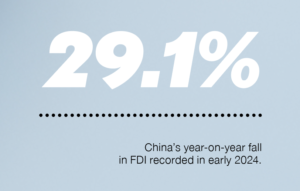
Amidst ongoing geopolitical tensions and a sluggish global recovery, cross-border investment remains subdued, contributing to China’s significant decline in foreign direct investment (FDI).[1] Recognising these challenges, China’s State Council adopted the Action Plan for Stabilising Foreign Investment in 2025 (Action Plan) on 10th February 2025.[2] In this article, Carlo Diego D’Andrea of D’Andrea and Partners Legal Counsel assesses the scope, significance and practical implications of the Action Plan for foreign investors while suggesting policy recommendations to further consolidate China’s position as an attractive destination for FDI, with Shanghai as its main hub.
The Action Plan outlines 20 targeted initiatives to reinforce China’s openness to global capital and address hindrances to foreign investment. It reaffirms China’s commitment to providing a more open, stable and predictable business environment for investors,[3] especially in the current context of global geoeconomic fragmentation and market turmoil.
A commitment to continued reform
Building upon existing policy frameworks, the Action Plan introduces significant refinements that indicate a transition from focussing solely on the scale of FDI to emphasising quality-orientated, rules-based opening up of the domestic economy.[4]
Key initiatives encompass the expansion of pilot programmes to areas previously restricted to international investment, such as telecommunications, healthcare and education, indicating a broader commitment to the further opening up of China’s domestic economic environment.[5] For instance, the Action Plan seeks to ease financing restrictions for foreign-invested enterprises (FIEs) while revising the scope of the ‘Negative List’, seeking to expand market access.[6]
Furthermore, the Action Plan underscores institutional opening by promoting alignment with international rules—particularly within pilot free trade zones—and by supporting foreign participation in strategic areas such as biomedicine.[7] These developments reflect the government’s broader efforts to further spur economic upgrading by supporting high-quality, innovation-led growth, which has been one of the pillars of China’s 14th Five-year Plan (2021–2025) within the framework of the ‘Dual Circulation’ strategy.[8]
These initiatives showcase the government’s renewed attention to FDI as a key driver for China’s economic dynamism, especially in the Yangtze River Delta economic zone.
Expected impact of the measures
China remains one of the world’s top FDI destinations, bolstered by its substantial domestic consumer market of 1.4 billion people (whose potential is yet to be fully unleashed),[9] advanced industrial capabilities, a vast pool of skilled workers, and continually improving logistics and digital infrastructure. These structural strengths are likely to sustain China’s appeal for high-value manufacturing and cutting-edge technology investments.[10]
Furthermore, in response to recent global trade disruptions, China has sought to present itself as a bulwark of globalisation. It signalled its continued receptiveness to FDI, enhancing the attractiveness of the Chinese domestic market amidst ever-growing fragmentation in global investment flow patterns.[11]
In particular, the prevailing trend of supply chain ‘de-risking’ and the resulting adoption of localised strategies (such as ‘in China, for China’) by an increasing number of multinational corporations (MNCs) could benefit China’s investment landscape, especially if the government continues to address access barriers and transparency issues. FIEs are increasingly more invested in hedging against geopolitical risk,[12] particularly after long-standing United States (US)-China trade disputes escalated into an outright trade war in April 2025.[13]

Nonetheless, investor concerns around an uneven business environment—particularly the preferential treatment afforded to Chinese state-owned enterprises and local firms—were deemed one of the main reasons behind the sharp decline in FDI inflow into the Chinese market, which fell 29.1 per cent year-on-year in early 2024.[14] Foreign investors have also long lamented the lack of intellectual property (IP) protection, opaque administrative procedures and unequal market access.
Hence, the Action Plan’s effectiveness will largely depend on its actual implementation, especially the ability of local governments to deliver greater regulatory predictability, facilitate capital flows and ensure a level playing field for foreign firms seeking to expand their activity into the Chinese market.[15]
Shanghai’s response to the Action Plan
As a key hub for international capital as well as the main recipient of foreign investment into mainland China, with FIEs accounting for more than one quarter of the city’s gross domestic product,[16] Shanghai has moved swiftly to operationalise the Action Plan.
Local strategies include the following initiatives.
- List of major foreign investment projects
A key component of the new policy is the creation of a dedicated list of major foreign investment projects in Shanghai for 2025. This approach aims to increase administrative efficiency and ensure that strategically significant foreign-funded projects receive tailored support.
By promoting high-level engagement with MNCs and foreign chambers of commerce, this list allows foreign investors to better navigate Shanghai’s FDI policy orientation. If enacted effectively, the measure could instil confidence among investors seeking efficiency and clarity, but international entrepreneurs have often pointed out the lack of actual implementation. Indeed, while the Chinese Government has made many promises to enhance the transparency and efficiency of the operational framework for foreign enterprises, such commitments have seldom been coupled with concrete actions. This led many foreign investors to gradually lose faith in the Chinese market as a principal investment destination, as highlighted by the European Chamber.[17]
- Overseas integrated service platform: Supporting ‘go global’ strategies
The policy package also emphasises the international expansion of firms headquartered in Shanghai as part of a broader government effort to promote Chinese investment internationally, as exemplified by the Belt and Road Initiative. By expanding its overseas integrated service platform, the government aims to facilitate outbound investment through more open access to legal, financial and market services.[18]
While modest in scope, if executed effectively, these measures could significantly reduce transaction costs and mitigate risks for overseas ventures, helping to position Shanghai as a two-way investment gateway. Further institutional support—including dedicated staff in key overseas markets and enhanced coordination platforms—would help expand its reach and effectiveness.[19]
- New incentives to boost the ‘debut economy’
In a bid to stimulate consumer spending and promote brand innovation, Shanghai Municipality recently unveiled a set of measures to strengthen its ‘debut economy’. These policies aim to stimulate domestic aggregate demand in key urban centres by incentivising international and domestic brands to launch new products or flagship stores in Shanghai,[20] often in conjunction with sports, tourism or cultural events.
These target incentives constitute a pragmatic response to subdued consumption levels. Although they may not revive consumer appetite for high-end and luxury goods, they could be effective for emerging brands seeking regional visibility.
Policy recommendations for the government
While the Action Plan is a significant step forward, additional reforms may be required to address investor apprehensions and fully harness China’s FDI potential, including:
a. Promoting legal transparency and accessibility: Establishing clear guidelines and streamlined processes for foreign investors can mitigate uncertainties and foster a more alluring business environment.[21]
The Shanghai Municipal Commission of Commerce could enhance transparency by publicly releasing detailed information on sectoral openness, project eligibility and approval procedures while reducing the scope of the ‘Negative List’ and enhancing its transparency. Regular stakeholder consultations and transparent policymaking would also reduce uncertainty and convey openness to foreign investment, especially in sectors undergoing regulatory change.[22]
b. Ensuring fair competition and regulatory clarity: Foreign investors continue to report discrimination in government procurement and inconsistent enforcement of regulations, often tilted in favour of domestic firms.[23]
To address these issues, Shanghai may consider adopting local-level guidelines promoting non-discriminatory procurement processes and issuing binding commitments to level the playing field for both foreign and Chinese enterprises, reinforcing IP protection and dispute resolution mechanisms.
c. Boosting investment upgrading through innovation: FDI inflows ought to be better aligned with national development goals such as industrial upgrading, and research and development cooperation, as acknowledged by the Shanghai Municipal Commission of Commerce.[24]
The city’s framework for MNC headquarters supports this objective, as exemplified by districts such as Pudong, Jinshan, Yangpu and Qingpu, which are already exploring new models for attracting high-tech and service-sector FDI by using targeted financial and regulatory tools to strengthen their global competitiveness.[25] However, deeper incentives for innovation partnerships between FIEs and domestic firms would further enhance cooperation.
d. Enhancing institutional capacity and local coordination: While decentralisation has streamlined approval processes, fragmentation across agencies appears to remain a key factor denting investor confidence.[26]
Shanghai may consider establishing a unified foreign investment coordination office to manage large-scale projects, provide cross-departmental and inter-agency support, and act as a point of contact for dispute resolution.[27]
e. Encouraging responsible business conduct: FDI research also emphasises the importance of promoting responsible business conduct (RBC) standards to ensure long-term sustainability goals of FIEs while further consolidating their social licence to operate in the Chinese market.[28] Shanghai may integrate RBC criteria into its major project list and offer support on environmental, social and governance practices for foreign firms to align with global sustainability trends.[29]
In sum, the Action Plan reflects a determined and pragmatic approach to
stabilising foreign investment amidst heightened external pressures. It builds
on China’s structural strengths—such as its advanced industrial base, central
position in key supply and value chains, and vast consumer market—while
addressing long-standing investor concerns through more targeted, rule-based
reform.
More specifically, aligning regulatory practices with international expectations, enhancing transparency and reinforcing legal guarantees will be essential for guaranteeing sustainable FDI growth in the near future. By further improving transparency, inclusiveness and institutional support for foreign investors, Shanghai is well-positioned to reinforce its role as a gateway to China and a core node in global investment networks.
Carlo Diego D’Andrea is managing partner of D’Andrea & Partners Legal Counsel. He is also vice president of the European Chamber and chairman of its Shanghai Chapter.
D’Andrea & Partners Legal Counsel is a
leading international law firm, with European headquarters situated in Milan,
Italy, and Asia-Pacific headquarters based in Shanghai, China. The firm has a
strong presence across major cities in China. The firm is one of the very few
international law firms in China duly authorised by the Ministry of Justice of
the PRC to operate as a Representative Office of a foreign law firm in China.
[1] World Investment Report 2024, United Nations Conference on Trade and Investment, 2024, viewed 22nd May 2025, <https://unctad.org/system/files/official-document/wir2024_en.pdf>
[2] Action Plan for Stabilising Foreign Investment in 2025, State Council, 22nd February 2025, viewed 22nd May 2025, <https://english.www.gov.cn/news/202502/22/content_WS67b9044dc6d0868f4e8efdff.html>
[3] Ibid.
[4] Foreign Investment Guide of the People’s Republic of China, Ministry of Commerce, 2024, viewed 22nd May 2025, <https://fdi.mofcom.gov.cn/resource/pdf/wx2024/2024EN.pdf>
[5] Action Plan for Stabilising Foreign Investment in 2025, State Council, 22nd February 2025, viewed 22nd May 2025, <https://english.www.gov.cn/news/202502/22/content_WS67b9044dc6d0868f4e8efdff.html>
[6] Ibid.
[7] Ibid.
[8] Foreign Investment Guide of the People’s Republic of China, Ministry of Commerce, 2024, viewed 22nd May 2025, <https://fdi.mofcom.gov.cn/resource/pdf/wx2024/2024EN.pdf>
[9] The China Imperative for Multinational Corporations, McKinsey Global Institute, 2023, viewed 13th June 2025, <https://www.mckinsey.com/~/media/mckinsey/mckinsey%20global%20institute/our%20research/the%20china%20imperative%20for%20multinational%20companies/the-china-imperative-for-multinational-companies_vf2.pdf>
[10] Foreign Investment Guide of the People’s Republic of China, Ministry of Commerce, 2024, viewed 22nd May 2025, <https://fdi.mofcom.gov.cn/resource/pdf/wx2024/2024EN.pdf>
[11] Leahy, J, and McMorrow, R, Xi Jinping pitches China to global CEOs as protector of trade, Financial Times, 29th March 2025, viewed 22nd May 2025, <https://www.ft.com/content/cf1d485e-5a37-4fcc-ac98-a7f03d33b7b9>
[12] The China Imperative for Multinational Corporations, McKinsey Global Institute, 2023, viewed 13th June 2025, <https://www.mckinsey.com/~/media/mckinsey/mckinsey%20global%20institute/our%20research/the%20china%20imperative%20for%20multinational%20companies/the-china-imperative-for-multinational-companies_vf2.pdf>
[13] US-China trade snarls as world’s biggest economies brace for divorce, Financial Times, 10th April 2025, viewed 22nd May 2025, <https://www.ft.com/content/e607a07b-1fc0-4664-9982-b93605baba0b>
[14] European Business in China Position Paper 2024/2025, European Union Chamber of Commerce in China, 11th September 2024, viewed 22nd May 2025, <https://www.europeanchamber.com.cn/en/publications-archive/1269/European_Business_in_China_Position_Paper_2024_2025>
[15] Ibid.
[16] Overview of Foreign Investment Policies in Shanghai, Shanghai Municipal Commission of Commerce, 2023, viewed 22nd May 2025, <https://english.shanghai.gov.cn/assets/Download/ff443467472adbdb0f9de2ecd3e53885.pdf>
[17] European Business in China: Position Paper 2024/2025, European Union Chamber of Commerce in China, 11th September 2024, viewed 13th June 2025, <https://www.europeanchamber.com.cn/en/publications-archive/1269/European_Business_in_China_Position_Paper_2024_2025>
[18] Foreign Investment Guide of the People’s Republic of China, Ministry of Commerce, 2024, viewed 22nd May 2025, <https://fdi.mofcom.gov.cn/resource/pdf/wx2024/2024EN.pdf>
[19] Shanghai Issued Measures to Stabilize Foreign Investment in 2025, D’Andrea & Partners Legal Counsel, 25th March 2025, 22nd May 2025, <https://www.dandreapartners.com/shanghai-issued-measures-to-stabilize-foreign-investment-in-2025/>
[20] Shanghai blazes path in growing debut economy, State Council, 30th December 2024, viewed 22nd May 2025, <https://english.www.gov.cn/english.www.gov.cn/news/202412/30/content_WS6772041fc6d0868f4e8ee5ec.html>
[21] China: Foreign Investment, Santander, March 2025, viewed 22nd May 2025, <https://santandertrade.com/en/portal/establish-overseas/china/foreign-investment>
[22] European Business in China Position Paper 2024/2025, European Union Chamber of Commerce in China, 11th September 2024, viewed 22nd May 2025, <https://www.europeanchamber.com.cn/en/publications-archive/1269/European_Business_in_China_Position_Paper_2024_2025>
[23] Ibid.
[24] Overview of Foreign Investment Policies in Shanghai, Shanghai Municipal Commission of Commerce, 2023, viewed 22nd May 2025, <https://english.shanghai.gov.cn/assets/Download/ff443467472adbdb0f9de2ecd3e53885.pdf>
[25] Ibid.
[26] China: Foreign Investment, Santander, March 2025, viewed 22nd May 2025, <https://santandertrade.com/en/portal/establish-overseas/china/foreign-investment>
[27] European Business in China Position Paper 2024/2025, European Union Chamber of Commerce in China, 11th September 2024, viewed 22nd May 2025, <https://www.europeanchamber.com.cn/en/publications-archive/1269/European_Business_in_China_Position_Paper_2024_2025>
[28] Bell, M, Why ESG performance is growing in importance for investors, EY, 9th March 2021, viewed 13th June 2025, <https://www.ey.com/en_gl/insights/assurance/why-esg-performance-is-growing-in-importance-for-investors>
[29] European Business in China: Position Paper 2024/2025, European Union Chamber of Commerce in China, 11th September 2024, viewed 13th June 2025, <https://www.europeanchamber.com.cn/en/publications-archive/1269/European_Business_in_China_Position_Paper_2024_2025>


Recent Comments